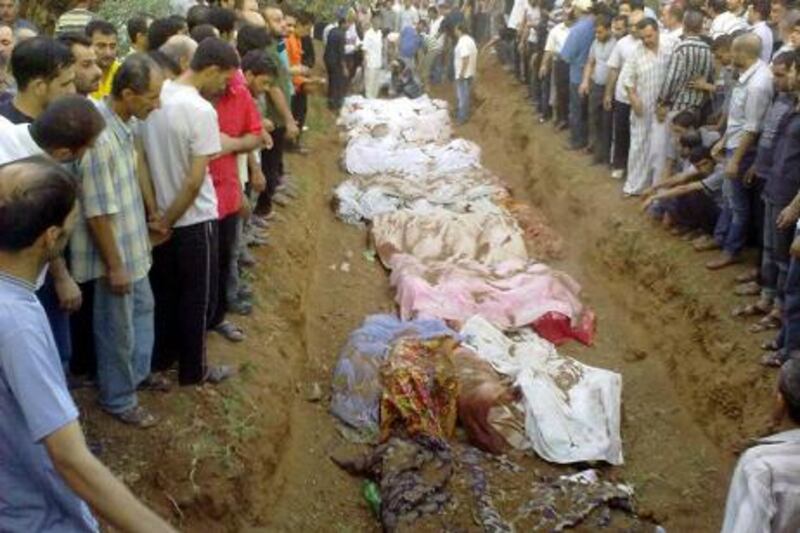The pain of grieving mothers who have lost their children is unbearable to watch. The mother of one young student, Anas, was still waiting to see her son's marks in the baccalaureate exams' results. Another student assured her that Anas's high score would make him eligible to study any field of engineering he chose. The student asked Umm Anas if her son would travel outside of Syria to study.
"No, my son died a couple of weeks ago, but his dream was to become an engineer," she replied. She is not alone in this anguish, and she will not be the last one to suffer so.
The story of Al Qadam neighbourhood in Damascus's outskirts is the same as that of many other areas in Syria. The anecdotes of young activists who chose to peacefully protest are the tragic, yet genuine, face of the Syrian uprising. As the country descends into civil war - as the battle for Aleppo rages, and regime thugs conduct house-to-house raids and summary executions in Damascus - it is worth remembering that the resistance began with young men like Anas.
The peaceful protest movement has changed, as activists have been killed, separated from each other and forced to escape, but they have kept their efforts going. Al Qadam was one of the first towns that joined the uprising and raised people's demands. Rooted in a community in which most people are relatively poor, Al Qadam protests initially focused on job opportunities, streamlining building permits and free presidential elections.
People of Al Qadam did not, at first, call for the regime to be toppled, only for freedom and dignity, and for economic reforms. After the first killings and mass arrests in the neighbourhood, the slogans transformed and the frequency of peaceful protests increased from one protest every Friday to several every day.
The young activists stuck to their belief in civil resistance, finding new ways to creatively defy the regime - a face of the uprising that has been ignored by the media. The savagery and repression that met them triggered the tendency towards arming the rebels. And yet, many activists would not resort to violence, and the support for their movement has decreased as funds are channelled to the Free Syrian Army in Al Qadam and in neighbouring areas.
"I am for peace and can't hold a gun or fight beside the rebels, but I support the Free Army," said Mazen, a young activist. "Few joined the FSA because they are jihadists; many did so because they believe in a better Syria, and others because they want to defend their honour and properties. They believe that this regime only understands the language of violence."
I can't forget the pale and frightened face of Salem, another young activist from Al Qadam, who was jailed and tortured for three months by the security forces. Several weeks ago, he told me: "Some TV channels have announced that the FSA 'liberated' Al Qadam. The whole neighbourhood will be shelled, we will have a massacre." I asked him if it was too late to correct the news report. He said he already had, but it was too late.
He could not have been more correct. That night intense bombing hit Al Qadam, forcing thousands of people to shelter in their basements until morning. The local estimate is that 90 per cent of residents fled to other areas in Damascus or went to Lebanon. Tens of thousands of women, children and elderly people sought refuge in schools and shelters in Sbeineh and Sahnaya on Damascus's outskirts. People are in dire need of food, water, clothing and other humanitarian assistance.
The destruction of Al Qadam and surrounding neighbourhoods was not limited to indiscriminate shelling, but extended to arson, the demolition of houses and the looting of properties. A field hospital and three pharmaceutical warehouses were destroyed. Residents have nothing to go back to.
Amid the disarray, a few people remained for various reasons. Sharif, in his 20s, couldn't leave his elderly mother nor take her outside given the shelling. A day later, his corpse, among many others, was found handcuffed and showing signs of torture. His friend Nidhal told me: "I couldn't say goodbye, my six best friends killed in one day. They are all gone."
Al Qadam's local coordination committee has declared it a disaster area. Activists that I spoke to said they blamed the mainstream media that insisted on announcing the "liberation" of Al Qadam despite their pleas not to do so. It simply wasn't true.
Every time the world marks a new "tipping point" to end the Assad regime, there is another wave of ferocity and more massacres. The assassination of three top commanders last month, which was perceived as a heavy blow against the regime, only intensified the viciousness directed against both rebels and civilians, with no distinction between the two. There is no safe place in Syria anymore; no street looks the same, and no Syrian is the same either.
It is "zulm" - a state of accumulated injustice, as described by The National columnist Hassan Hassan earlier this year. The word connotes bitterness, suffering, suppression and severity.
It is zulm - mothers are losing their children and husbands, friends losing each other, and elderly people ending their days in shelters, hungry and afraid. People are losing their livelihoods, their businesses, their dignity, and their very natures. Revenge and violence have replaced the peaceful uprising begun by Anas and his fellows. Is anything at all left of Syria as it used to be?
The author writes from Damascus under the pseudonym of Jasmine Roman
On Twitter: @JasmineRoman01





